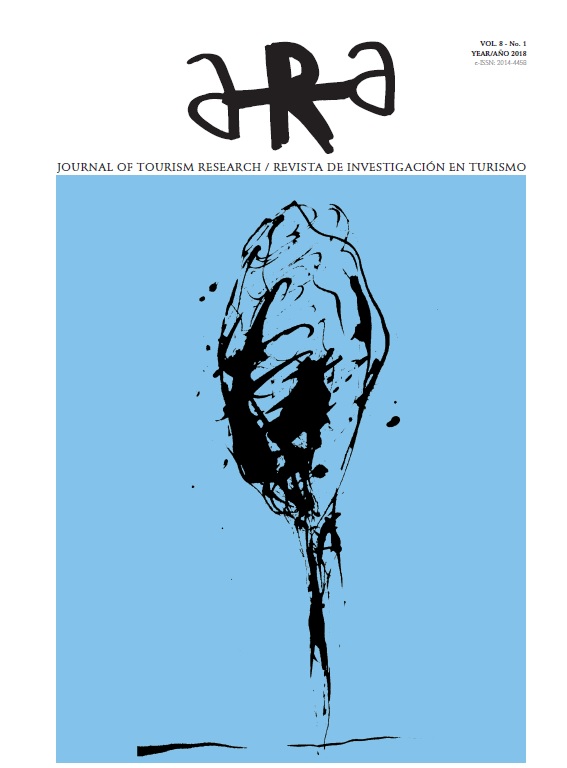Reflections on Tourism Actors perception of Spanish Smart Tourism Destinations
DOI:
https://doi.org/10.1344/ara.v8i1.21102Keywords:
, Smart Tourism Destinations, Delphi, Tourism agents, BarcelonaAbstract
The aim of this paper is to debate the IT concept from the perception different agents of the tourism sector have about it and to see to what extent there is agreement or disagreement in the definition of the concept itself, its influence on the competitive improvement of destinations and future trends. In short, it intends to analyze the potential, but also to understand the risks and main challenges that the incorporation of IT can cause over current destinations. The work procedure involves asking experts in the tourism sector and in the academic world about the different thematic areas on IT and ITD: the definition of the concept and the welfare of its evolution in the immediate future, the characteristics and components of an ITD system, the role of the technological components in an ITD, the linking of IT with sustainability, the limits and risks of IT display, and the determinants and conditionings that destinations have for the development of IT strategies. The collected information has been obtained from the opinion of around thirty experts, with the purpose of gathering different points of view through the Delphi method: the academic specialists (belonging to national and international universities), those affected (from the case of study of the tourist municipalities of the province of Barcelona) and the facilitators (companies and organizations involved in the use of technologies to promote IT).
References
Anuar, F. & Gretzel, U. (2015) Privacy concerns in the context of location-based services for tourism. Documento electrónico: http://ertr.tamu.edu/files/2013/02/13.pdf
Atzori, L; Iera, A. & Morabito, G. (2010) The Internet of Things: A survey. Computer Networks, 54, 2787-2805.
Egger, R. (2013) The impact of near field communication in tourism. Journal of Hospitality and Tourism Technology, IV(2), 119-133
Fernández, M. (2016) La smart city como imaginario socio-tecnológico. La construcción de la utopia urbana digital. Tesi Doctoral. Universidad del Pais Vasco.
Green, H.; Hunter, C.; Moore, B. (1990). Application of the Delphi Technique in Tourism. Annals of Tourism Research, 17, 270-279.
Gretzel, U. (2011) Intelligent systems in tourism. A social science perspective. Annals of Tourism Research, 38 (3), pp. 757-779.
Gretzel,U et al (2015) Smart Tourism Challenges. Journal of Tourism, 16 (1), 41-47
Instituto de Economía Aplicada a la Empresa de la Universidad del País Vasco (2002). Aplicación del método Delphi en la elaborción de la tabla simétrica de las tablas input-output 2020 de Catalunya. IDESCAT: Barcelona
INVAT-TUR (2015) Destinos turísticos inteligentes. Manual operativo para la configuración de destinos turísticos inteligentes. València, INVAT-TUR.
Ivars, J.; Solsona, F.J & Giner, D. (2016) Gestión turística y tecnologia de la información y la comunicación (TIC): El nuevo enfoque de los destinos inteligentes. Documents d’Anàlisi Geogràfica, 6(2), 327-346
Komninos, N.; Pallot, M & Schaffers, H. (2013) Spetial issue on smart cities and the future Internet in Europe. Journal of Knowledge Economy, 4, 119-134.
Lamsfus, C. & Alzua, U. (2013) Theoretical framework for a tourism Internet of Things: Smart Destinations tourGUNE Journal of Tourism and Human Mobility (0), 15-21.
Landeta, J. (1999). El método Delphi. Una técnica de previsión para la incertidumbre. Editorial Ariel: Barcelona.
Linstone, H. Y Turoff, M. (1975). The Delphi Meted. Techniques and Applications. Addison-Wesley.
López de Ávila, A. & García, S. (2014) Destinos turísticos inteligentes. Documento electrónico:http://www.minetur.gob.es/Publicaciones/Publicacionesperiodicas/EconomiaIndustrial/RevistaEconomiaIndustrial/395/LOPEZ%20DE%20AVILA%20y%20GARCIA.pdf
Luque, A.M.; Zayas, B.; & Caro, J.L. (2015) Los destinos turísticos inteligentes en el marco de la inteligencia territorial: conflictos y oportunidades. Investigaciones Turísticas, 10, 1-25.
March, H. & Ribera, R. (2014) Smart contradictions: The politics of making Barcelona a Self-sufficient city. European Urban and Regional Studies, 1-15.
Martínez, A.; Pérez, P. & Solanas, A. (2013) The pursuit of citizen's privacy: A provacy-aware smart city is possible. IEEE Communication Magazine, 136-141.
Michael, M.G.; Fusco, S.J. & Michael, K. (2008) A research note on ethics in the emerging age of überveillance. Computer Communications, 31, 1192-1199.
Minghetti, V. & Buhalis, D. (2016) Digital divide in tourism. Journal of Travel Research, 49 (3), 267-281.
Neuhofer, B. ; Buhalis, D. & Ladkin, A. (2012) Conceptualising Technology enhanced experiences. Journal of Destination Marketing & Management, 1, 36-46.
Neuhofer, B. ; Buhalis, D. & Ladkin, A. (2015) Smart tecnologies for personalized experiences: a case study in the hospitality domain. Electronical Markets, 25, 243-254.
Sigala, M. (2012) Social media and crisis managenent in tourism: applications and implications for research. Information Technology & Tourism, 13(4), 269-283
Wang, D.; Park, S. & Fesenmaier, D.R. (2012) The role of smartphone in mediating the tourist experience. Journal of Travel Research, 51(4), 871-887.
Yeh, D-Y i Cheng, C-H (2015). Recommendation system for popular tourist attractions in Taiwan using Delphi panel and repertory grid tècniques. Tourism Management 46, 164-176.
Downloads
Published
How to Cite
Issue
Section
License
The authors who publish in ARA agree to the following terms:
- Authors retain copyright and grant the journal the right of first publication.
- Texts will be published under a Creative Commons Attribution License that allows others to share the work, provided they include an acknowledgement of the work’s authorship, its initial publication in this journal and the terms of the license.
- This material may not be used for commercial purposes.
- You may not distribute the modified material.
Attribution-NonCommercial-NoDerivatives 4.0 International (CC BY-NC-ND 4.0)














